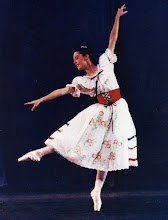I remember well the dreaded parent observation week at the studios where I used to teach. Depending on the age of the students, having parents observing class could either be a help or a hindrance. Usually the youngest children find it a distraction and the oldest ones tend to pull their acts together. I never changed my method of teaching for the sake of the parents who were sitting along the sidelines, but it’s interesting to note the various types of parents with kids who dance.
The best parents are those that have done their homework prior to enrolling their children: they know the teachers are qualified and believe their manner of teaching is credible. They don’t question the rules, the dress code, or the reason their child mostly stands in the back line during the performance at the end of the year. They are concerned with progress and do their utmost to ensure their child comes to class prepared to work hard and focus on improving. These are the best parents.
Then there are the “stage” parents. These parents wonder aloud why their child is not yet dancing en pointe, why he or she doesn’t have a solo, and why his or her class is not working on more complicated steps yet. Somehow these parents are more visible, and definitely more annoying, to the teacher of dance. My advice if you have a child who is taking ballet is to make sure the teachers have some kind of background in dance. You’d be surprised—just about anyone can open a dance studio. Many people have a degree in dance from a university, and many have professional credits to their name which is just as important. A dance school brochure should really be up front about their teachers’ credentials (unless they don’t have any worth mentioning, and then beware!).
When a cast list goes up and your child didn’t get the lead, don’t assume that means he or she doesn’t have talent. And if you’re a dancer, understand that being cast in a corps de ballet or solo role can be just as wonderful a learning experience as being cast as the principal dancer. One of my favorite roles to ever dance was the White Cat in Sleeping Beauty. I loved that role and got to dance it while I was a student at Indiana University. The steps were not so difficult, but it gave me a chance to work on characterization and not being me on stage. It really was a liberating experience. Learning to leave yourself behind and become your character can take a lot of stress out of dancing.
Sometimes the “lead” role is not even the leading role, so don’t be misled! In an art form like dance where there is such a hierarchy going on (corps de ballet, soloists, principal dancers), it’s easy to forget that there are no small parts, only small actors (not sure where that quote originates, but I tend to agree with it). And sometimes just because a role isn’t the “lead” doesn’t mean it isn’t the hardest role to dance.






No comments:
Post a Comment